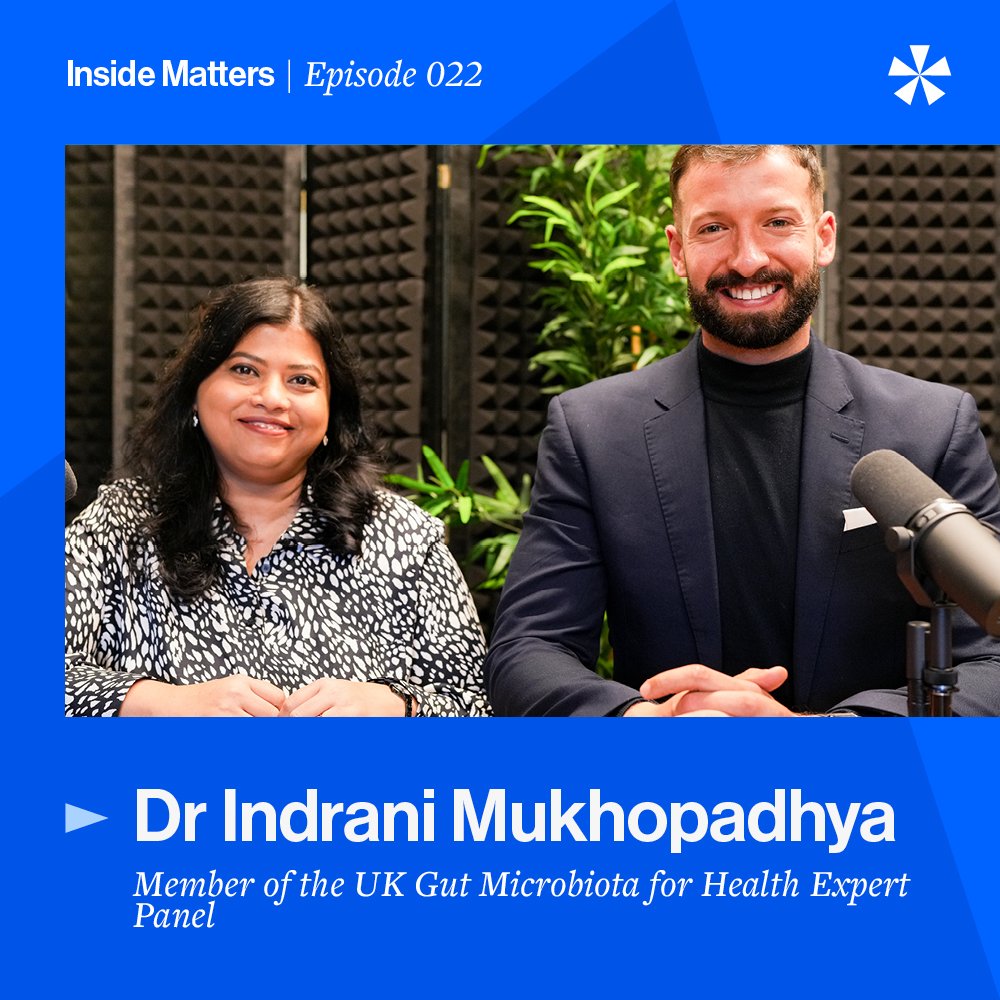Welcome to
Microbiome Monthly

Dive into the hidden universe inside you with our exclusive newsletter, where the mysteries of the microbiome unfold in every issue!
Dr James McIlroy brings you the most compelling takeaways from the recent episodes of the Inside Matters Podcast. Join us on a journey through ground-breaking conversations with leading experts, unravelling the intricate connections between our gut and overall health.
But that's not all – get ready to get excited by our handpicked selection of some of coolest research in the realm of gut microbiome science. From cutting-edge insights into the gut-brain axis to revolutionary findings about diet and disease, we have got the pulse on what's new and noteworthy. Whether you're fascinated by the link between gut health and neurological disorders like Parkinson's and Alzheimer's, curious about the role of superfoods like blueberries in nurturing your gut microbiota, or want to learn more about the application of machine learning to microbiome datasets, we have got you covered.
Stay ahead of the curve in the ever-evolving world of microbiome research. Your journey to understanding the complex ecosystem within starts here, in Microbiome Monthly!
November's edition of Microbiome Monthly…
Episode 022 Summary
Dr. Indrani Mukhopadhya –
The Importance of Virome in Health and Disease
Summary and take homes
Indrani, a lecturer at the University of Aberdeen, discussed the significance of the virome (the viral component of the microbiome) in health and disease. Indrani described the virome being dynamic in nature, just like the bacterial component, and potentially more numerous than the other microbial elements of the gut microbiome. Estimates of the ratios between viruses and bacteria in the gut range from 0.01-10.
The virome consists of: eukaryotic viruses (those than infect human cells), bacteriophages (phages), which infect other bacteria, viruses that infect other microorganisms, such as archaea, and finally, viruses that are transient passengers on food substances. Linkage between viruses and disease states has been described and understood for centuries, however, the nature and importance of viral ecosystems only began to be appreciated through the development of advanced DNA sequencing methods.
We still know relatively little about the virome, hence its nickname of ‘dark matter’. Indrani touched on phage therapy, which is the application of phages to treat bacterial infections. Later in the episode, we covered inflammatory bowel disease and the role of viral elements and specific bacterial depletions in the microbiome.
Read more about Indrani’s work here: https://www.researchgate.net/profile/Indrani-Mukhopadhya, and see here for interesting review on the virome: https://www.nature.com/articles/s41579-021-00536-5
Episode 021 Summary
Professor Karen Scott –
Microbiome, Bacteria, and Dietary Fibre
Summary and take homes
Karen is a renowned gut health researcher. We discussed various aspects of the gut microbiome, including the effectiveness and limitations of probiotics, defining a healthy microbiome, and ways to improve it through diet, nutrition, and possibly supplements. Karen personally does not take a probiotic, which I found interesting, although there are specific circumstances in which she would consider taking one, such as after a course of antibiotics.
Karen described the concept of ‘antibiotic mediated collateral damage’, which, in short, refers to the unintended harmful consequences associated with taking antibiotics. Taking as probiotic could potentially offset the collateral damage and indeed, some studies suggest that this could be a good use for probiotics. All antibiotics have an impact on the gut microbiome, some more than others. They play an essential and lifesaving role in treating infections, but we should be mindful of not overusing them due to collateral damage and antibiotic resistance (AMR). Karen is worried about AMR. She described AMR as being the leading cause of death worldwide by 2050 if novel antibiotics and/or antimicrobials are not developed and commercialised.
We also delved into the role of dietary fibre and its sources, beyond just fruits and vegetables, and speculated on future directions of microbiome research. Fibre is really important for gut microbiome health, so make sure you each a variety of high fibre food sources. We also had a fun debate about obesity. My view is that the microbiome contributes to obesity and the changes observed in obese patients are not simply consequences of the obesity. Karen was more sceptical
Read more about Karen’s work here: https://www.abdn.ac.uk/rowett/research/profiles/k.scott
Episode 020
Kristina Campbell –
Probiotics and Gut Health
Summary and take homes
Kristina Campbell is a science writer specialising in microbiome science. We discussed the quality criteria of probiotics, differentiating good from bad ones. Kristina told us about an exciting new book that she is writing called gut health for dummies. She also provided a helpful and easy to action overview of how to assess is a probiotic is potentially useful or not. Here is a short summary:
Ask yourself why you want to take a probiotic – this is defined as the intended use;
Review the available evidence for probiotics and the intended use. The best way to do this is to ask an expert, if you have one in your network. The second best approach would be to use ChatGPT and PubMed;
Find a probiotic product that matches on a strain-to-strain basis with the potentially beneficial strains identified through your research or expert recommendations;
Check for third party testing and analysis. This provides a higher level of quality assurance than one that does not go third party testing;
Gradual introduction. Start with a lower dose, then work your way up. This could potentially minimise side effects, such a bloating / gas;
Consistency is key, keep it up once you start for a reasonable period of time. I suggest several weeks.
The conversation included insights into the future of the field, recent drug approvals related to gut health, and tips for parents to ensure a gut-healthy diet for their children (not easy). This episode marked the podcast's first remote recording, which was awesome.
Read more about Kristina’s work here: https://www.bykriscampbell.com




